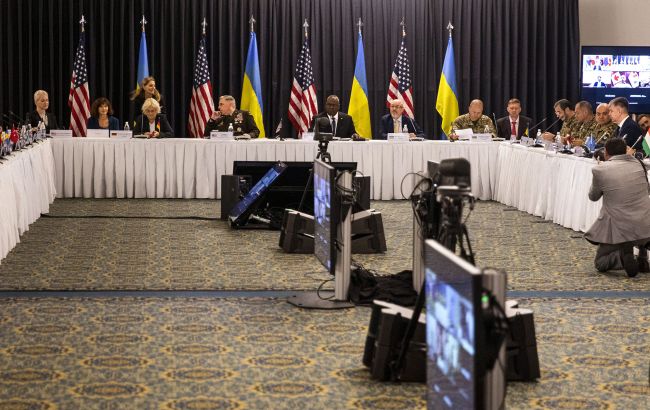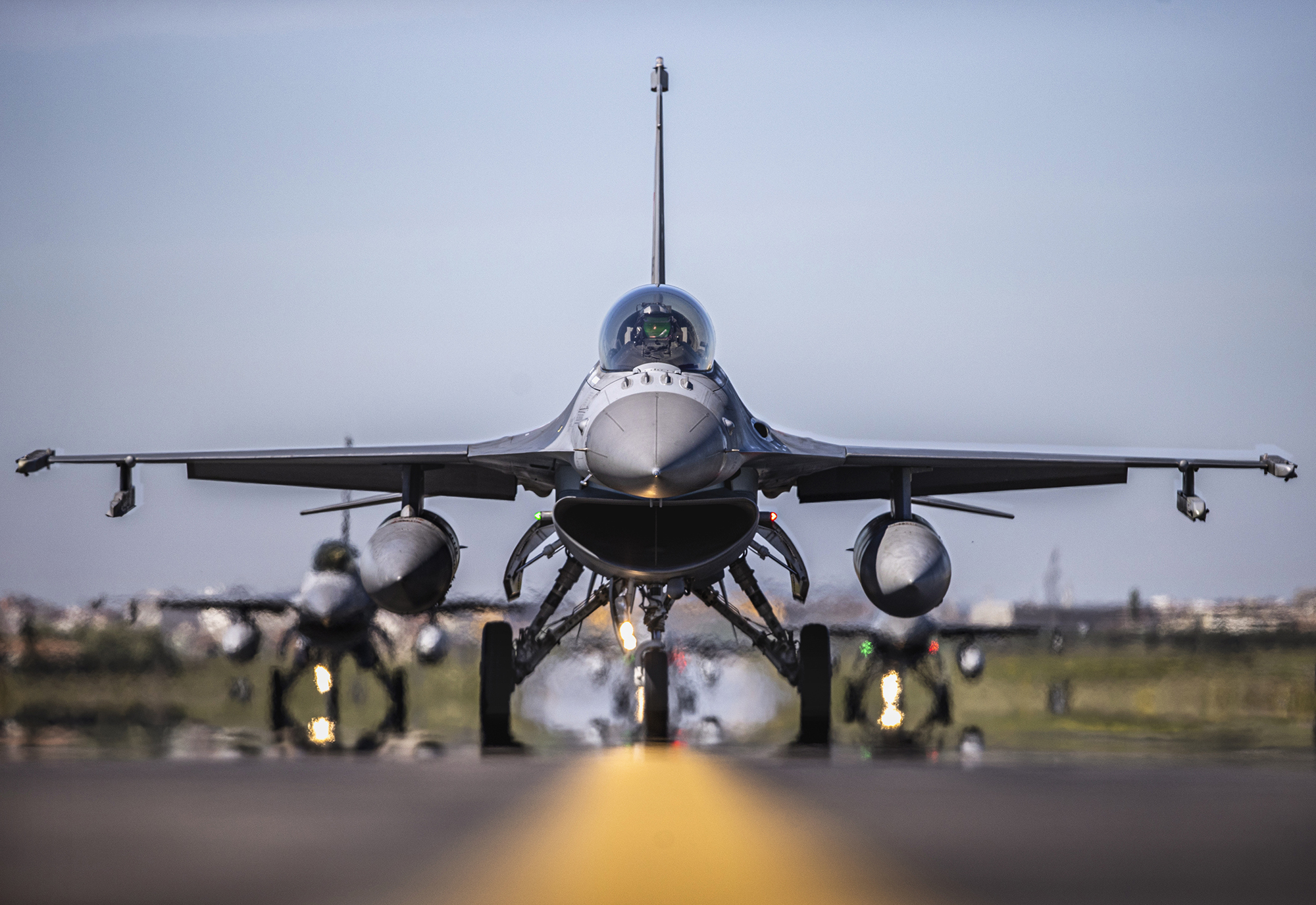Ramstein-13 agenda: F-16 coalition and weapons for Ukraine's counteroffensive
 Ramstein 13 will be held in a face-to-face format in Brussels (Getty Images)
Ramstein 13 will be held in a face-to-face format in Brussels (Getty Images)
Allies of Ukraine are gathering for the latest Ramstein negotiations today, June 15. The main focus of the meeting is the "aircraft coalition" and the training of Ukrainian pilots. The Ramstein Contact Group will also discuss the strengthening of military assistance for the successful counteroffensive of the Armed Forces of Ukraine. RBC-Ukraine has compiled everything about Ramstein-13 and what to expect from the summit in Brussels.
Negotiations at NATO headquarters
The 13th meeting in the Ramstein format was announced for June 15, 2023. This time, the participants of the defense coalition will meet in person at NATO headquarters in Brussels. That same day, summit of defense ministers of NATO member countries will take place on the same platform.
The Ramstein-13 meeting will begin at 11:00 AM Kyiv time with introductory remarks from the U.S. Secretary of Defense.
As always, the negotiations will be chaired by the head of the Pentagon, Lloyd Austin. The US representative, General Mark Milley, will also be present.
At 5:15 PM, a joint statement is expected from Lloyd Austin and NATO Secretary General Jens Stoltenberg. After that, at 6:00 PM, the Ukraine-NATO Commission meeting will begin.
Main focus
The focus of the events in Brussels will be the issue of countering Russian aggression. Discussions will start within the Ramstein Contact Group and continue at the level of NATO defense ministers.
According to a Pentagon representative, the allies will focus on how to effectively support Ukraine now and in the future. The following topics will be on the agenda:
- air defense, anti-tank systems, and ammunition, both close and long-range - the needs of the Armed Forces of Ukraine for offensive operations;
- spare parts, maintenance instructions, and repair of military equipment in field conditions;
- operational compatibility of weapons, modernization, and capabilities of military-industrial complexes of partner countries;
- "future capabilities" of the Ukrainian forces - training of fighter pilots.
NATO Secretary General Jens Stoltenberg announced that the issue of training Ukrainian pilots on Western fighters will be discussed on June 15 after the Ramstein meeting. Several Alliance member countries have already made decisions regarding pilot training. Photo: Ramstein 13 summit will discuss training of Ukrainian Armed Forces pilots on F-16 fighters (Getty Images)
Photo: Ramstein 13 summit will discuss training of Ukrainian Armed Forces pilots on F-16 fighters (Getty Images)
Aircraft, air defense, artillery, and equipment repair: Ukraine's expectations from the meeting
The key task for Ukraine at Ramstein will be working on the "aircraft coalition."
Defense Minister Oleksiy Reznikov announced that there are plans for a substantive discussion on pilot training and logistics with the defense teams of the Netherlands, Denmark, the United States, and other coalition countries.
The Ukrainian delegation includes representatives from the Air Force of the Armed Forces of Ukraine, which suggests that negotiations regarding fighter jets are entering the final stage.
"During the meeting, we will discuss the details of the 'aircraft coalition.' We are currently talking about the training of pilots and not only pilots, but also our technicians and engineers who will be involved in aircraft maintenance, as it is a very complex system," explained the minister.
Ukrainian officers responsible for pilot training and logistics will be present at Ramstein-13.
Strengthening air defense, artillery, ammunition, and the supply of munitions also remain a priority for the Ukrainian side.
Discussions will include the establishment of hubs for equipment repair and provisioning in both Ukraine and allied countries.
"This war is a war of resources. Resources mean not only weapons, but also the ability to repair and service it, and everything related to it," said Reznikov.
Fighter aircraft coalition
No official decision has been made regarding the "fighter aircraft coalition" for Ukraine. However, during his visit to Moldova on June 1, President Volodymyr Zelenskyy raised the issue during meetings with European leaders. In particular, they discussed the training of Ukrainian pilots on F-16 and other types of aircraft.
The head of state called the negotiations successful and announced that work on creating the coalition would continue during the next Ramstein meeting. Zelenskyy said that partners are ready to provide "powerful support" in terms of fighter jets, but it requires rebuilding Ukrainian infrastructure.
Several European countries and Canada have expressed their willingness to train Ukrainian pilots on F-16 jets. U.S. President Joe Biden confirmed the intention to join the initiative. This marked the beginning of an international coalition since other countries could not approve the transfer of American fighters to Ukraine without Washington's coordination.
To obtain the aircraft, Ukrainian pilots must undergo training, which is expected to take about four months. Poland, the United Kingdom, the Netherlands, and Denmark have expressed readiness to train Ukrainian pilots and provide logistical support. Denmark has mentioned the possibility of commencing pilot training in August 2023.
In addition to F-16 jets, allies may also transfer F-18 fighters to the Ukrainian Air Force. Ukraine has already requested this type of aircraft from Australia, which is transitioning to more advanced F-35s.
The Ukrainian Ministry of Defense said that to liberate the occupied territories of Ukraine from Russia, the Armed Forces of Ukraine would require four squadrons of Western fighters, approximately 48 aircraft in total.
New military aid from allies
Ukraine's partners are stepping up their military assistance in light of news about the start of the Ukrainian Armed Forces' counteroffensive operations.
Prior to the Ramstein-13 summit, the United States announced that they will provide another package of assistance, the 40th one, totaling $325 million to "strengthen the Ukrainian forces on the battlefield." This package will include Stryker and Bradley armored vehicles, NASAMS air defense systems, HIMARS artillery rocket systems, etc.
Reports also indicate that the United States will supply depleted uranium rounds for Abrams tanks (which are set to arrive in the fall) to Ukraine.
Denmark announced the transfer of approximately 2,000 artillery shells for $36 million, while Belgium will provide 105mm caliber ammunition for €32.4 million.
Germany plans to increase the delivery of refurbished Leopard 1 tanks to meet Ukraine's needs. This decision came after news of damage to a Leopard 2 tank on the battlefield. Defense Minister Boris Pistorius said that Germany cannot replace every lost tank but will increase the supply of refurbished Leopard 1 A5 tanks from July onwards.
The United Kingdom has announced a $115 million aid package in the field of air defense. This assistance will be procured through an international fund and will include weapons, radars for air defense systems, and a significant amount of ammunition.
Canada will provide $327 million worth of weaponry, including additional AIM-7 Sparrow missiles and 10,000 rounds of 155mm caliber ammunition.
During Ramstein summit, the Netherlands will announce a €40 million allocation for the purchase of air defense equipment for Ukraine as part of a multilateral partnership. They will also supply four €150 million VERA-EG radar systems to the Armed Forces of Ukraine.
Prior to Ramstein summit, Commander-in-Chief of the Armed Forces of Ukraine Valerii Zaluzhnyi had a telephone conversation with General Mark Milley, the U.S. Army Chief of Staff. The military officials discussed strengthening air defense, artillery, and counter-battery capabilities.

